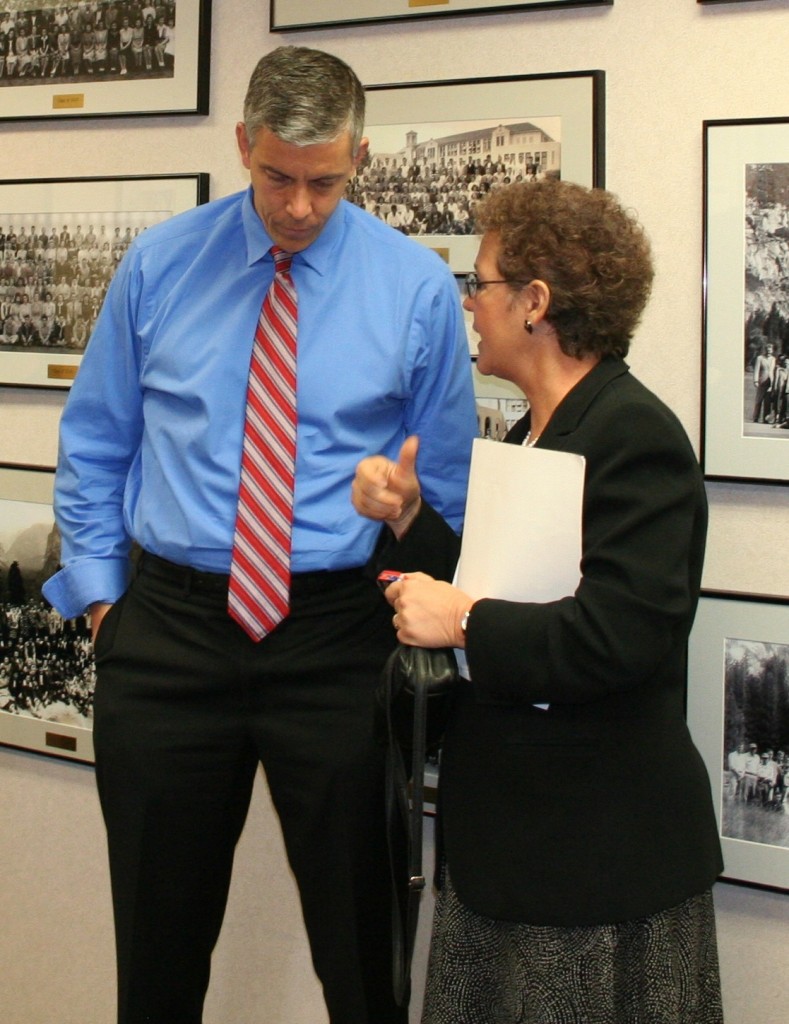
U.S. Secretary of Education Arne Duncan says it’s not too late for California to pursue a NCLB waiver. Credit: Kathryn Baron, EdSource Today
California remains interested in receiving a waiver from sanctions under the No Child Left Behind law, and U.S. Secretary of Education Arne Duncan said Wednesday it remains possible for the state to get one. But, Duncan said in an interview after an event in Sunnyvale, “It’s late in the game” to apply for a state waiver to take effect this fall. (Go here for the transcript of the interview.)
Duncan wasn’t more forthcoming about a deadline or the odds that the state would get a waiver, but he was clear about leaving the door open for California – one of only a half-dozen states without an application either approved or pending in Washington.
State officials have had continuing discussions with their federal counterparts about requirements for a waiver, and Duncan said that he and Gov. Jerry Brown had met to talk about it when Brown was in Washington two months ago. But Karen Stapf Walters, an adviser to Brown and the executive director of the state Board of Education, said Wednesday that talks remained “at a conceptual level,” and the state Department of Education has not yet started to write an application. The issue of a waiver is not on the state Board’s bimonthly meeting next week.
The timing is tricky, and the issue is politically sensitive, because Duncan now has before him an application from nine California districts for a separate district waiver. That application, through their nonprofit, the California Office to Reform Education, or CORE, has already undergone a formal federal review, and will be resubmitted, in response to extensive reviewers’ questions, sometime in May, Rick Miller, executive director of CORE, said this week.
CORE submitted its application out of frustration after the state’s application was denied in December and the state failed to resubmit another this spring. It’s unclear what the impact on CORE’s pending application would be if the state actually submitted a competing application sometime in the next few weeks.
Responding to states’ education chiefs who don’t want their authority undermined, Duncan has said that he would only consider district applications in those states without waivers. Pressed on that point, Duncan told EdSource: “That’s absolutely correct. So if the state came in with an application we approved, we’d be working with the state, not with a small set of districts.”
The state would have to move quickly, however. School districts would need to know at the latest by early July for a waiver to take effect this fall. Before that, the state Board would need to give 10 days notice for a special meeting to approve an application. Once submitted, it would go through a review process that would take at least weeks, if not longer, depending on federal officials’ concerns. And, of course, an application would take time to write.

Duncan confers with Stanford University education professor Linda Darling-Hammond at Fremont High School in Sunnyvale on Wednesday after a panel discussion on the report of the Equity and Excellence Commission. Darling-Hammond was one of the 27 commissioners. Credit: Kathryn Baron, EdSource Today
A waiver from NCLB would give districts flexibility in spending hundreds of millions of dollars in Title I money for low-income students, and it would suspend some of the sanctions for thousands of Title I schools, designated for Program Improvement, that failed to meet annual academic targets. In exchange, the state would have to agree to specify how it would improve the lowest-performing 15 percent of schools, and it would have to agree to require all districts to conduct teacher evaluations that include standardized test scores as a “significant” component.
It was the latter requirement that Brown declined to agree to in the state’s first application, and it remains a point of contention. However, state Board of Education President Michael Kirst said that the state is examining waivers approved for other states, particularly Oregon and Washington, to see if California can define “significant” in way that will work.
Kirst said there are other difficult issues as well. California is in the process of revising its district and school accountability system to include factors other than test scores, and the Legislature may suspend some of the yearly tests taken by high school students and English learners, as Superintendent of Public Instruction Tom Torlakson has proposed. The federal government may not agree with so much in flux, he said.
The CORE districts are proposing a sharply different approach to accountability, with school improvement based on district collaboration and peer review. Using the province of Ontario as a model, CORE also wants to pare back annual high-stakes testing for every student in every grade – a cardinal principle of NCLB.
Assuming CORE and the federal government can work through disagreements, one option would be to grant a district waiver for a year, leading to a state waiver after that, based on lessons learned from CORE’s experiment.
The nine CORE districts include Los Angeles Unified, Long Beach, Fresno, San Francisco and Oakland, and represent a combined 1 million California students.
To get more reports like this one, click here to sign up for EdSource’s no-cost daily email on latest developments in education.















Comments (1)
Comments Policy
We welcome your comments. All comments are moderated for civility, relevance and other considerations. Click here for EdSource's Comments Policy.
California Teacher 11 years ago11 years ago
It appears no waiver from sanctions was extended to Poway Unified’s Garden Road Elementary School as teachers there were notified last week that as a result of cuts in Title 1 funds, they will not be bringing back IMPACT Aid Program Staff.